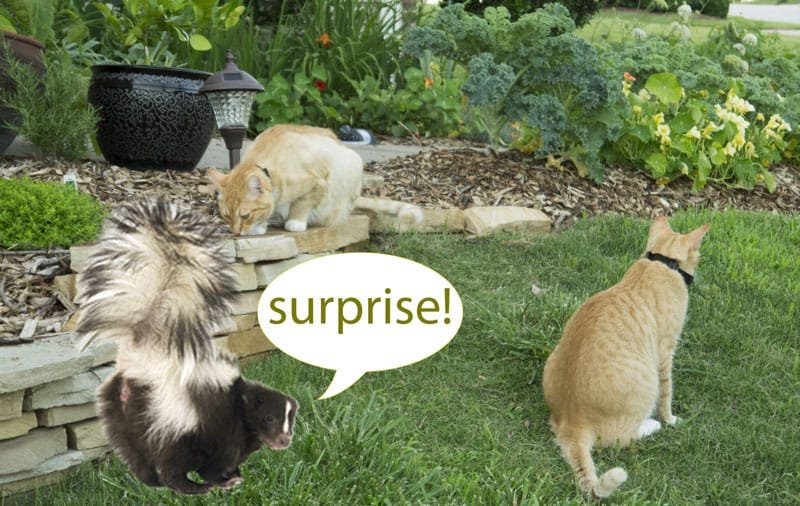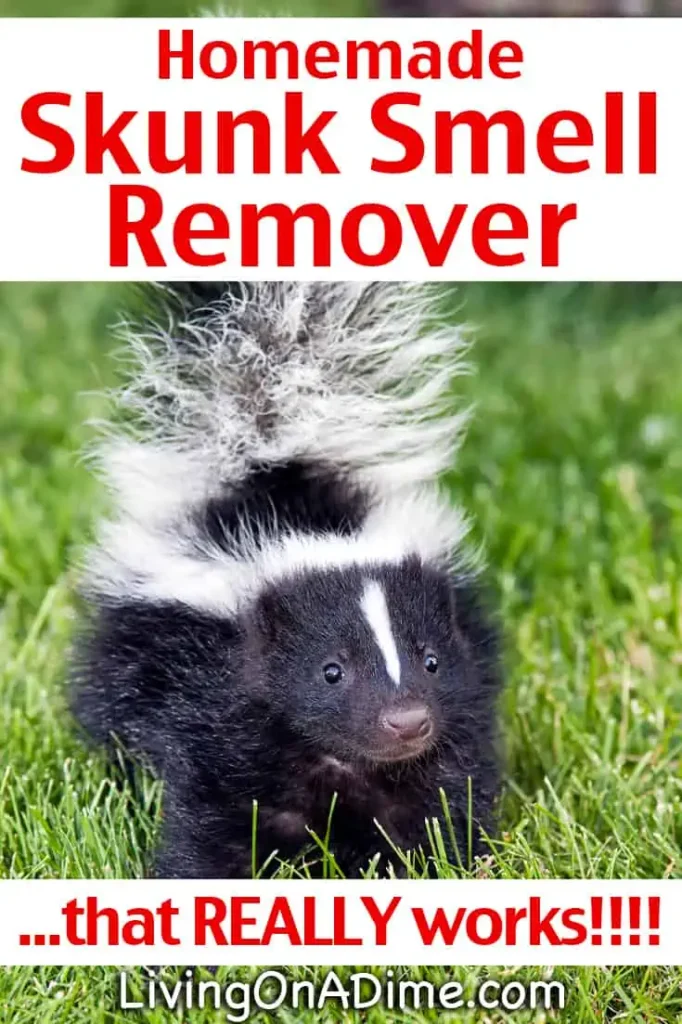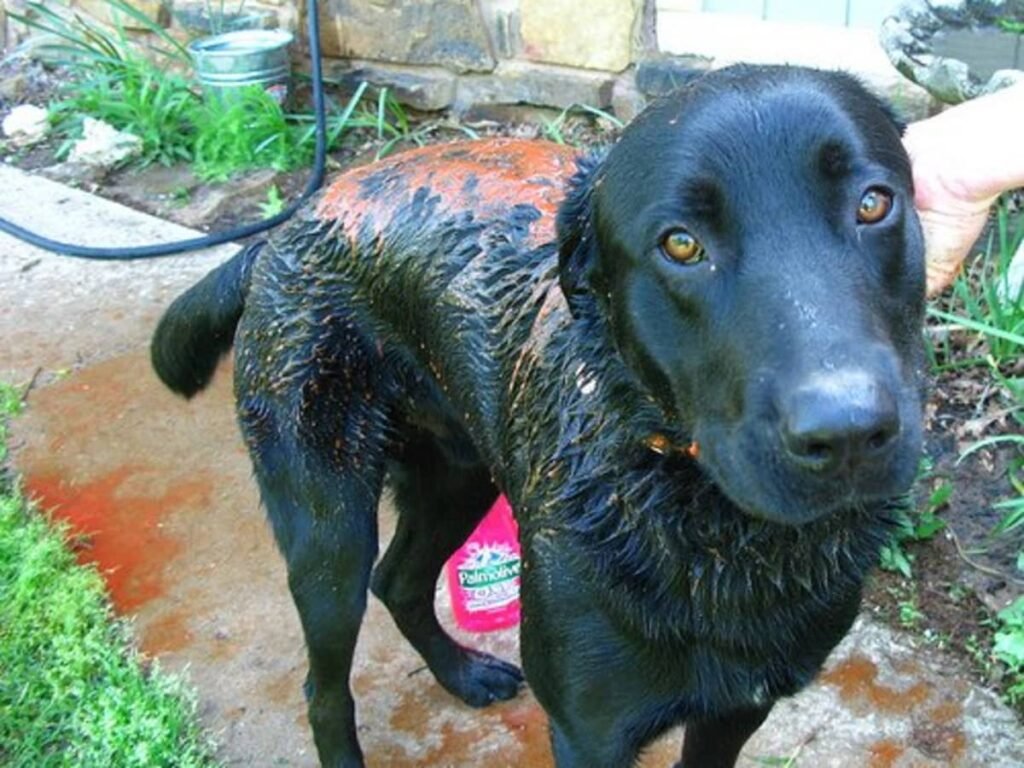Are you dealing with the aftermath of your cat’s unfortunate encounter with a skunk? Don’t worry, we’ve got you covered. In this article, you will discover effective tips and tricks on how to help your beloved feline friend get rid of that lingering skunk smell. From gentle shampoos to natural remedies, we’ll provide you with simple solutions to ensure your cat can enjoy a skunk-free and fresh-smelling existence once again.
Prevention is Key
Skunk-proof your yard
To prevent your cat from encountering skunks in the first place, it’s important to take measures to skunk-proof your yard. Start by ensuring that your yard is secure and there are no holes or gaps where skunks can enter. Install fencing or barriers around your property to keep skunks out. Additionally, remove any attractants such as trash cans or food sources that may entice skunks to come into your yard.
Supervise outdoor time
When allowing your cat to spend time outdoors, make sure you supervise them closely. Keep an eye out for any signs of skunk activity in the area and quickly intervene if you see a skunk approaching. By being vigilant, you can prevent your cat from getting too close to a skunk and potentially getting sprayed.
Use deterrents
There are a variety of skunk deterrents available that can help keep skunks away from your property. These include motion-activated sprinklers, ultrasonic devices, and natural repellents such as citrus peels or ammonia-soaked rags. Place these deterrents strategically around your yard to create a skunk-free zone and protect your cat from skunk encounters.
Train your cat
Teaching your cat basic commands can be helpful in preventing skunk encounters. By training your cat to come when called or to stay in a certain area of the yard, you can easily redirect them away from skunks. Additionally, consider using positive reinforcement techniques to reward your cat for staying away from skunk-prone areas.
Handling the Aftermath
Keep calm and assess the situation
After your cat has been sprayed by a skunk, it’s important to stay calm and assess the situation. Panicking or being overly stressed can agitate your cat further, so take a deep breath and approach the situation with a clear mind.
Isolate the affected cat
To prevent the skunk odor from spreading to other areas of your home, isolate the affected cat in a specific room or area. This will also give you the opportunity to focus on deodorizing your cat without any distractions.
Check for injuries
While skunk spray is not harmful to cats, it’s still important to check your cat for any signs of injuries. Look for scratches, bites, or any other visible wounds that may have occurred during the encounter. If you notice any injuries, contact your veterinarian for further guidance.
Call the veterinarian
Even if your cat appears to be uninjured, it’s always a good idea to contact your veterinarian after a skunk encounter. They can provide guidance on how to effectively remove the skunk odor and may recommend any necessary treatments or follow-up care.


Immediate Steps
Avoid touching or rubbing the sprayed areas
When handling a cat that has been sprayed by a skunk, it’s important to avoid touching or rubbing the sprayed areas. Skunk spray contains sulfur compounds that can irritate the skin and eyes, so it’s best to avoid direct contact. Wear gloves when handling your cat to protect yourself from the odor and any potential skin irritation.
Wear protective clothing and gloves
To protect yourself from the skunk odor and any potential skin irritation, it’s important to wear protective clothing and gloves when handling your cat. This will prevent the skunk smell from transferring to your skin and clothes.
Confine the cat in a safe space
Immediately after a skunk encounter, confine your cat to a safe space such as a bathroom or laundry room. This will allow you to address the skunk odor without your cat wandering around the house and spreading the smell.
Open windows for ventilation
To help dissipate the strong skunk odor, open windows in the room where your cat is confined. This will allow fresh air to circulate and help reduce the intensity of the smell.
Choosing the Right Skunk Odor Remover
Avoid using tomato juice
Contrary to popular belief, tomato juice is not an effective skunk odor remover. It may temporarily mask the smell, but it does not eliminate it completely. Instead, opt for more effective skunk odor removal methods.
Look for specialized skunk odor removal products
There are specialized skunk odor removal products available on the market that are specifically designed to neutralize and eliminate the skunk smell. These products contain ingredients that break down the sulfur compounds in the skunk spray, effectively removing the odor from your cat’s fur.
Read product labels and reviews
Before purchasing a skunk odor removal product, make sure to read the product labels and reviews. Look for products that are safe for use on pets and have positive reviews from other cat owners who have had success in removing skunk odor.
Consider natural remedies
If you prefer to use natural remedies, there are several options available that can help remove skunk odor from your cat’s fur. These include using a mixture of hydrogen peroxide, baking soda, and dish soap or applying diluted apple cider vinegar to the affected areas. However, it’s important to note that natural remedies may not be as effective as specialized skunk odor removal products.
Preparing the Cleaning Mixture
Gather necessary ingredients
To prepare the skunk odor removal solution using hydrogen peroxide, baking soda, and dish soap, gather all the necessary ingredients. Make sure you have a fresh bottle of hydrogen peroxide, a box of baking soda, and a mild dish soap that is safe for use on pets.
Mix hydrogen peroxide, baking soda, and dish soap
In a large bowl or bucket, mix together one quart of 3% hydrogen peroxide, 1/4 cup of baking soda, and one teaspoon of mild dish soap. Stir the mixture well to ensure all the ingredients are combined.
Follow the recommended measurements
It’s important to follow the recommended measurements when preparing the skunk odor removal solution. Using excessive amounts of hydrogen peroxide or baking soda can potentially cause skin irritation or other issues, so measure the ingredients accurately.
Prepare the mixture in a well-ventilated area
When preparing the skunk odor removal mixture, make sure to do it in a well-ventilated area. The strong odor from the skunk spray combined with the cleaning solution can be overwhelming, so open windows or doors to allow fresh air to circulate.
Applying the Skunk Odor Removal Solution
Test the solution on a small area
Before applying the skunk odor removal solution to your cat’s fur, it’s important to test it on a small area first. Apply a small amount of the mixture to an inconspicuous area, such as the back of the ear, and wait for a few minutes. If there is no adverse reaction, it is safe to proceed with using the solution on the rest of your cat’s fur.
Apply the mixture thoroughly to the sprayed areas
Gently pour or spray the skunk odor removal solution onto the sprayed areas of your cat’s fur. Be sure to saturate the fur thoroughly, making sure to get the solution down to the skin. Massage the solution into the fur using your gloved hands, making sure to cover all the affected areas.
Leave the solution on for a few minutes
After applying the skunk odor removal solution, allow it to sit on your cat’s fur for a few minutes. This will give the solution time to break down the sulfur compounds in the skunk spray and neutralize the odor.
Rinse the solution off with warm water
After the recommended wait time, rinse your cat’s fur thoroughly with warm water to remove the skunk odor removal solution. Make sure to rinse all the areas that came into contact with the skunk spray, ensuring that there is no residue left behind.


Managing Skunk Odor on Fur
Avoid using peroxide mixture directly on fur
Although the hydrogen peroxide mixture can be effective for removing skunk odor, it may not be suitable for direct contact with your cat’s fur. The peroxide can bleach or discolor your cat’s fur, especially for cats with lighter-colored coats. It’s best to use the hydrogen peroxide mixture on the sprayed areas and follow up with a pet-friendly odor-removing shampoo for the rest of your cat’s fur.
Use pet-friendly odor-removing shampoos
After removing the skunk odor from the sprayed areas, it’s important to wash your cat’s entire body to fully eliminate the skunk smell. Use a pet-friendly odor-removing shampoo specifically formulated to neutralize strong odors. Make sure to follow the instructions on the shampoo bottle for the best results.
Follow the instructions on the shampoo bottle
When using the odor-removing shampoo, follow the instructions on the bottle carefully. Pay attention to the recommended amount to use and the suggested duration to leave the shampoo on your cat’s fur. This will ensure that the shampoo is effective in removing any lingering skunk odor.
Consider professional grooming services
If you are unsure about how to effectively remove the skunk odor from your cat’s fur or if your cat is resistant to being bathed, consider seeking professional grooming services. Professional groomers have experience in dealing with skunk encounters and can safely and effectively remove the skunk odor from your cat’s fur.
Addressing Eye and Mouth Irritation
Flush the eyes with saline solution or clean water
If your cat’s eyes were exposed to skunk spray and show signs of irritation, gently flush the eyes with a saline solution or clean water. Use a small dropper or a clean cloth soaked in the solution to remove any skunk residue from the eyes. If the irritation persists or worsens, contact your veterinarian for further guidance.
Contact your veterinarian for advice
If your cat’s mouth came into contact with skunk spray and shows signs of discomfort or irritation, contact your veterinarian for advice. They may recommend rinsing your cat’s mouth with water and can provide further guidance on how to alleviate any mouth discomfort.
Offer your cat water to rinse its mouth
To help your cat rinse its mouth and remove any skunk residue, offer fresh water for your cat to drink. This can help alleviate any lingering taste or discomfort caused by the skunk spray.
Monitor for any signs of discomfort or distress
After your cat has encountered a skunk, it’s important to monitor them closely for any signs of discomfort or distress. Look out for excessive scratching, grooming, or licking, as these may indicate residual skunk odor or irritations. If you notice any concerning symptoms, contact your veterinarian for further guidance.


Dealing with Lingering Smell
Ventilate the affected areas
To help rid your home of the lingering skunk odor, make sure to ventilate the affected areas. Open windows, use fans, or set up air purifiers to help circulate fresh air and remove the skunk smell. This will help improve the overall air quality in your home.
Wash all surfaces with a vinegar solution
Vinegar is a natural deodorizer and can effectively help remove skunk odor from surfaces. Mix equal parts vinegar and water and use this solution to wash any surfaces that came into contact with the skunk odor, such as floors, walls, or furniture. Allow the solution to sit for a few minutes before wiping it clean.
Use natural odor absorbers like activated charcoal
Activated charcoal is known for its odor-absorbing properties and can help eliminate lingering skunk smell in your home. Place activated charcoal in small bowls or open containers and distribute them strategically in the affected areas. Replace the activated charcoal regularly to ensure its maximum effectiveness.
Consider professional cleaning services
If the skunk odor persists despite your best efforts, consider hiring professional cleaning services that specialize in odor removal. These professionals have the knowledge, equipment, and products to effectively remove stubborn skunk odor from your home.
Precautions and Additional Tips
Keep cats indoors during skunk mating season
Skunk mating season typically occurs from February to March and then again from June to July. During these periods, it’s recommended to keep your cats indoors to avoid encounters with skunks. This will greatly reduce the chances of your cat getting sprayed.
Create a skunk encounter plan
It’s always a good idea to have a skunk encounter plan in place in case your cat comes into contact with a skunk again in the future. This plan should include steps on how to handle the situation, recommended products to use, and contact information for your veterinarian.
Regularly check for skunk activity in the area
Stay aware of skunk activity in your area by regularly checking for signs such as skunk tracks, burrows, or strong skunk odors. By staying vigilant, you can take preventive measures to protect your cat and your property from skunk encounters.
Consult with a professional if skunks are a recurring problem
If you are consistently experiencing issues with skunks in your area or on your property, it may be beneficial to consult with a professional wildlife control service. They can assess the situation, offer advice on skunk prevention, and provide solutions to deter skunks from your property.


Your Expert in Animal Control and Extermination. Trust our experience for humane, effective pest management, protecting your property and ensuring peace of mind with Michael S.





